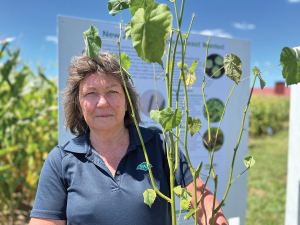NZ winegrowers advance vineyard biosecurity in 2025
The year was marked by “progress, collaboration and reflection” in biosecurity, says New Zealand Winegrowers Biosecurity Advisor Jim Herdman.
 North Island velvetleaf co-ordinator Sally Linton warns that velvetleaf can decimate the New Zealand cropping sector.
North Island velvetleaf co-ordinator Sally Linton warns that velvetleaf can decimate the New Zealand cropping sector.
A recently held arable field day in the Manawatu brought with it a timely reminder to be on the lookout for velvetleaf incursions.
Classified as an unwanted organism under the Biosecurity Act, the invasive weed can produce up to 30,000 seeds that can survive for 50 years, while statistics note that, uncontrolled, it has the potential to reduce yields by up to 70%.
With the current maize planting regime under way in the North Island, disturbed soils offered an ideal environment for what may have been long dormant seeds to germinate.
North Island velvetleaf co-ordinator Sally Linton reminded growers that given the weed's potential to decimate the New Zealand cropping sector, the economic "ripple effect" could affect the dairy, food production and export sectors.
"Fighting velvetleaf is a shared responsibility, that everyone needs to be involved with, including the grower, their neighbours, contractors and seed merchants," said Linton.
An annual weed that is typically active between October and April, the invasive broad-leaved weed has been identified in over 100 North Island properties, largely in the maize crops of Auckland and the Waikato. Of particular interest to the assembled growers were 13 known incursions in the Horizons region, likely occurring on the arrival of fodder beet to the area following the wider 2016-17 fodder beet incursion in the South Island.
That general incursion occurred in Southland, Otago and Canterbury, traced back to Italian fodder beet seed, imported to feed the growing interest in fodder beet as a winter feed crop.
Emerging as a seedling, the weed quickly matures by aroun 100 days, identified by large heart-shaped leaves, buttery yellow flowers of about 3cm across and the eventual arrival of distinctive black seed pods of 2.5cm diameter, made up of 12-15 segments. Of particular concern is the fact that a single mature plant, that might grow to 1.2 to 1.5 metres high, can produce up to 30,000 seeds that can survive for up to 50 years.
Linton said, "Looking at maize crops taken for silage, the seeds are not killed during the heating process of ensiling. Indeed, the use of feed pads, that in turn lead to feed waste and effluent washing, means that viable seeds can easily be spread over a wide area of a property, without realising."
Linton suggested that anyone buying-in silage, should be inspecting source crops ahead of harvesting and confirm with suppliers that the property was velvetleaf-free. They should also confirm from harvesting contractors whether they had worked at infected properties, and if this was the case, were up to speed with appropriate hygiene practices, before moving to the next job.
As part of the monitoring programme, regional councils are funding inspections, undertaken by Linton in the North Island, while also being assisted by a highly trained detector dog. The detector dog, Wink, was generally used to inspect properties in Nov/Dec after emergence again in Jan/Feb, before harvesting commences.
"However, inspections by councils and with the dog are only to known incursions and where a suspected incursion maybe through tracing of machinery and crop movements," said Linton.
"You cannot insure against a biosecurity risk, so it's in all our interests to be proactive in getting on top of this problem. You also need to realise you cannot sell a crop from a property where seeding velvetleaf is present. If you do suspect an incursion, photography the suspected plant, mark its location and contact MPI via 0800-80-99-66, or your regional council."
Fonterra’s impending exit from the Australian dairy industry is a major event but the story doesn’t change too much for farmers.
Expect greater collaboration between Massey University’s school of Agriculture and Environment and Ireland’s leading agriculture university, the University College of Dublin (UCD), in the future.
A partnership between Torere Macadamias Ltd and the Riddet Institute aims to unlock value from macadamia nuts while growing the next generation of Māori agribusiness researchers.
A new partnership between Dairy Women’s Network (DWN) and NZAgbiz aims to make evidence-based calf rearing practices accessible to all farm teams.
Despite some trying circumstances recently, the cherry season looks set to emerge on top of things.
Changed logos on shirts otherwise it will be business as usual when Fonterra’s consumer and related businesses are expected to change hands next month.
OPINION: Fonterra may be on the verge of selling its consumer business in New Zealand, but the co-operative is not…
OPINION: What does the birth rate in China have to do with stock trading? Just ask a2 Milk Company.